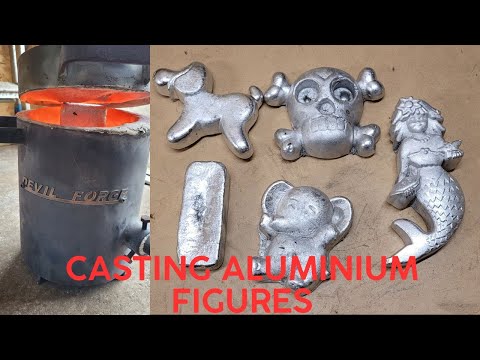Everything about Stahl Specialty Company
Everything about Stahl Specialty Company
Blog Article
Some Known Facts About Stahl Specialty Company.
Table of ContentsStahl Specialty Company Fundamentals ExplainedEverything about Stahl Specialty CompanyThe Basic Principles Of Stahl Specialty Company The 2-Minute Rule for Stahl Specialty CompanyStahl Specialty Company Fundamentals Explained
The refined distinction lies in the chemical content. Chemical Contrast of Cast Aluminum Alloys Silicon promotes castability by decreasing the alloy's melting temperature and boosting fluidness during spreading. It plays an essential duty in allowing intricate mold and mildews to be loaded accurately. Additionally, silicon adds to the alloy's stamina and wear resistance, making it valuable in applications where durability is essential, such as vehicle components and engine components.It also improves the machinability of the alloy, making it simpler to refine into ended up items. By doing this, iron adds to the total workability of aluminum alloys. Copper enhances electrical conductivity, making it useful in electric applications. It also boosts corrosion resistance and adds to the alloy's total strength.
Manganese contributes to the toughness of aluminum alloys and improves workability. It is frequently made use of in wrought light weight aluminum items like sheets, extrusions, and profiles. The existence of manganese aids in the alloy's formability and resistance to splitting throughout fabrication procedures. Magnesium is a light-weight component that provides stamina and influence resistance to light weight aluminum alloys.
Zinc boosts the castability of aluminum alloys and helps control the solidification procedure throughout spreading. It improves the alloy's strength and hardness.
Stahl Specialty Company Fundamentals Explained
Since aluminum-silicon alloys have great spreading buildings, high gas residential properties, simple procedures, and superb rust resistance, aluminum-silicon alloys are most generally made use of in the die-casting sector in your home and abroad. At the same time, aluminum-silicon alloys are likewise reasonably early and widely identified alloys developed and utilized in die-casting. After continual study and enhancement, a lot of the current international mainstream aluminum-silicon alloys have been settled and are absolutely nothing greater than A356, A360, A380, ADC12, B390, and A413.
The main thermal conductivity, tensile strength, return toughness, and prolongation vary. Amongst the above alloys, A356 has the highest possible thermal conductivity, and A380 and ADC12 have the most affordable.

A Biased View of Stahl Specialty Company
In accuracy casting, 6063 is well-suited for applications where detailed geometries and high-quality surface finishes are critical. Examples include telecommunication units, where the alloy's premium formability permits sleek and aesthetically pleasing layouts while keeping structural stability. In a similar way, in the Lights Solutions industry, precision-cast 6063 elements develop sophisticated and effective lights components that need intricate forms and good thermal performance.
(https://www.cybo.com/US-biz/stahl-specialty-company_1P)
It brings about a finer surface coating and better corrosion resistance in A360. The A360 exhibits remarkable elongation, making it perfect for facility and thin-walled components. In accuracy spreading applications, A360 is well-suited for markets such as Customer Electronics, Telecommunication, and Power Tools. aluminum metal casting. Its improved fluidity permits intricate, high-precision elements like additional reading smartphone cases and communication gadget housings.

In precision spreading, aluminum 413 beams in the Customer Electronics and Power Tools markets. This alloy's exceptional rust resistance makes it an excellent selection for exterior applications, making certain resilient, durable items in the mentioned markets.
The smart Trick of Stahl Specialty Company That Nobody is Discussing
The light weight aluminum alloy you pick will considerably influence both the casting process and the residential or commercial properties of the last product. Because of this, you must make your choice thoroughly and take an enlightened technique.
Identifying the most appropriate aluminum alloy for your application will mean weighing a large selection of attributes. These relative alloy features adhere to the North American Die Casting Organization's guidelines, and we've divided them into two categories. aluminum foundry. The initial classification addresses alloy attributes that impact the production process. The second covers attributes affecting the properties of the final product.
The alloy you pick for die spreading directly influences several aspects of the spreading process, like just how easy the alloy is to deal with and if it is susceptible to casting defects. Hot splitting, additionally recognized as solidification cracking, is a normal die spreading flaw for aluminum alloys that can lead to internal or surface-level tears or cracks.
10 Simple Techniques For Stahl Specialty Company
Particular light weight aluminum alloys are extra vulnerable to warm cracking than others, and your selection must consider this. One more typical issue found in the die casting of light weight aluminum is die soldering, which is when the cast adheres to the die wall surfaces and makes ejection difficult. It can harm both the cast and the die, so you need to seek alloys with high anti-soldering buildings.
Rust resistance, which is currently a significant characteristic of light weight aluminum, can differ significantly from alloy to alloy and is a vital particular to think about depending on the ecological conditions your item will be subjected to. Put on resistance is one more residential or commercial property commonly looked for in aluminum items and can set apart some alloys.
Report this page